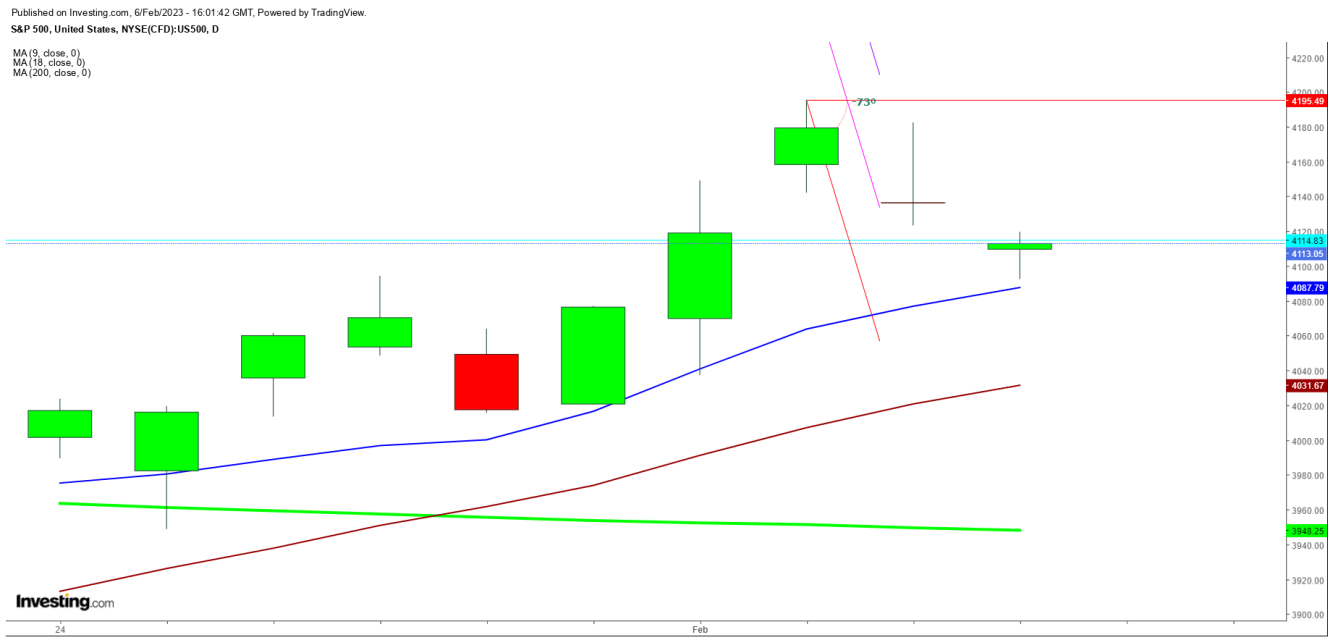Movements of the S&P 500 since the Fed’s interest rate hike on Feb. 1 indicate that despite the late weekly selling, the index still managed to close last week with a 1.6% gain.
Thursday’s bumpy trading pushed the S&P 500 to 4195.49 before it then lost some gains; this was followed by a selling spree again on Friday from the day’s high at 4182.40, resulting in the formation of an exhaustion candle.
Friday’s monster jobs report added another blow to bulls, further accelerating a late-week selloff. While the U.S. economy was supposed to add 185,000 jobs, the report showed it added 517,000.
Monday, the S&P 500 could get a confirmation candle for this exhaustion candle, formed on Friday, if not hold the immediate support as it was trading below the significant support at 4141.83 after a weekly gap-down opening.
Undoubtedly, some analysts feel the further direction of the S&P 500 index still looks bullish, as the current selling spree could be a temporary phenomenon.
But I find the technical formations in the daily chart make it evident that this is not the case, and evolving geopolitical events could play a decisive role in defining the further direction for equity markets.
The balloon episode has already further strained tense relations, prompting Washington to cancel a planned visit over the weekend to Beijing by Secretary of State Antony Blinken.
This incident could lead to a surge in supply bans like we saw during the tariff trade war between the United States and China in 2018-19, which pushed the S&P 500 to hit a low at 2342 on Dec. 24, 2018.
No doubt, if the S&P 500 does not hold significant support at 9 DMA, which is at 4086 in today’s session, bears could turn more aggressive and try to break the next support at 26 DMA soon.
In such a scenario, bearish sentiment could explode enough to push the S&P 500 to hit 200 DMA support, which is at 3948 this week.
Disclaimer: The author of this analysis does not have any positions in the S&P 500 index. Readers are advised to take any position at their own risk.
- English (USA)
- English (UK)
- English (India)
- English (Canada)
- English (South Africa)
- English (Philippines)
- English (Nigeria)
- Deutsch
- Español (España)
- Español (México)
- Français
- Italiano
- Nederlands
- Português (Portugal)
- Polski
- Português (Brasil)
- Русский
- Türkçe
- العربية
- Ελληνικά
- Svenska
- Suomi
- עברית
- 日本語
- 한국어
- 简体中文
- 繁體中文
- Bahasa Indonesia
- Bahasa Melayu
- ไทย
- Tiếng Việt
- हिंदी
S&P 500 Faces Uncertainty Amid Blockbuster Jobs Report, Chinese Balloon Incident
Published 07/02/2023, 03:21 am
S&P 500 Faces Uncertainty Amid Blockbuster Jobs Report, Chinese Balloon Incident
Latest comments
Loading next article…
Install Our App
Risk Disclosure: Trading in financial instruments and/or cryptocurrencies involves high risks including the risk of losing some, or all, of your investment amount, and may not be suitable for all investors. Prices of cryptocurrencies are extremely volatile and may be affected by external factors such as financial, regulatory or political events. Trading on margin increases the financial risks.
Before deciding to trade in financial instrument or cryptocurrencies you should be fully informed of the risks and costs associated with trading the financial markets, carefully consider your investment objectives, level of experience, and risk appetite, and seek professional advice where needed.
Fusion Media would like to remind you that the data contained in this website is not necessarily real-time nor accurate. The data and prices on the website are not necessarily provided by any market or exchange, but may be provided by market makers, and so prices may not be accurate and may differ from the actual price at any given market, meaning prices are indicative and not appropriate for trading purposes. Fusion Media and any provider of the data contained in this website will not accept liability for any loss or damage as a result of your trading, or your reliance on the information contained within this website.
It is prohibited to use, store, reproduce, display, modify, transmit or distribute the data contained in this website without the explicit prior written permission of Fusion Media and/or the data provider. All intellectual property rights are reserved by the providers and/or the exchange providing the data contained in this website.
Fusion Media may be compensated by the advertisers that appear on the website, based on your interaction with the advertisements or advertisers.
Before deciding to trade in financial instrument or cryptocurrencies you should be fully informed of the risks and costs associated with trading the financial markets, carefully consider your investment objectives, level of experience, and risk appetite, and seek professional advice where needed.
Fusion Media would like to remind you that the data contained in this website is not necessarily real-time nor accurate. The data and prices on the website are not necessarily provided by any market or exchange, but may be provided by market makers, and so prices may not be accurate and may differ from the actual price at any given market, meaning prices are indicative and not appropriate for trading purposes. Fusion Media and any provider of the data contained in this website will not accept liability for any loss or damage as a result of your trading, or your reliance on the information contained within this website.
It is prohibited to use, store, reproduce, display, modify, transmit or distribute the data contained in this website without the explicit prior written permission of Fusion Media and/or the data provider. All intellectual property rights are reserved by the providers and/or the exchange providing the data contained in this website.
Fusion Media may be compensated by the advertisers that appear on the website, based on your interaction with the advertisements or advertisers.
© 2007-2025 - Fusion Media Limited. All Rights Reserved.
